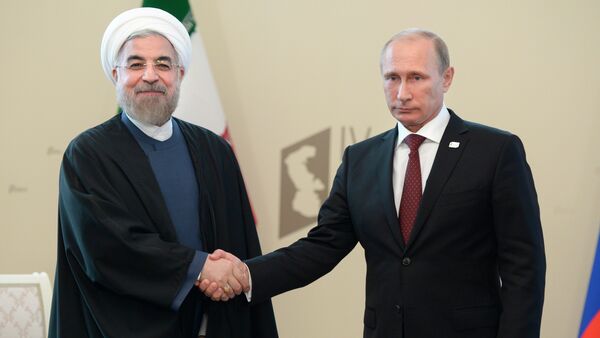MOSCOW, October 28 (RIA Novosti) — Russia will speak in favor of signing the agreement on Iran's nuclear program at the next P5+1 meeting on November 24, the deadline agreed upon by the six powers this summer, General Director of the Center of Studies of Modern Iran Rajab Safarov told RIA Novosti Tuesday.
"Russia is interested in the agreement being signed as it sees that Iran has done a great deal, it has done a lot for its nuclear program to be transparent," Safarov said.
"It is possible to pick holes in it but it is not within the functions of the P5+1, but of an authorized organization such as IAEA [International Atomic Energy Agency]. The P5+1 is a political institution, while the six powers and Iran make political decisions, based on the recommendations of the organizations such as IAEA and the checks this organization carries out," he said.
The West has accused Tehran of developing nuclear weapons under the guise of a civilian nuclear program — claims repeatedly denied by the Iranian authorities. At a meeting held in November 2013 in Geneva, Iran and the P5+1 group — China, France, Germany, Russia, the United Kingdom, and the United States — agreed to reach a long-term nuclear agreement by July 2014. The deadline was later postponed to November 24, 2014.
In the meantime, Safarov said that Russia considers Iran to have behaved beyond reproach and will advocate for the existing sanctions on Iran to be lifted despite the potential competition in the energy market Tehran will present for Moscow.
"Iran has adhered rigorously to the obligations it has undertaken. IAEA checks show that all Iran's declarations have been completed well and on time. Iran's nuclear program has become very transparent and absolutely controllable. In this situation, there is no need whatsoever to keep the sanctions in place, that is why Russia is pro signing the agreement," he said.
With all the sanctions removed from Iran, the resource-rich Middle Eastern country is expected to enter the energy market offering more oil for sale, which may drop oil prices and make Russia less competitive on the European market.
It is not Russia, however, that is inhibiting the process of the removal of the sanctions, Safarov said, but the United States, fearful of Iran emerging too powerful and independent in such an influential region.
"The US doesn't want [the signing of the agreement]. America is the chief opponent. Had America wanted it, it would persuade all of its partners, the UK, Germany and France on this issue. The United States are playing a destructive role here. They understand that a lot depends on Iran, including their interests," Safarov said, adding that after six years of discussions on the issue, Washington is losing its power in the game.
"I don't think the United States will overpower everyone else this time. There will be some serious negotiations now, various choices will be viewed, including signing separate treaties, large-scale trade, economic and military contracts, setting conditions for future. I do not exclude, that following the signing of the agreement, if that happens, many interesting contracts will be signed on the basis of these talks," the expert added.
"This is a symbol of the United States getting weaker. America can no longer handle this, because it has no resources and finances," he said.
The P5+1 group representatives, including US Secretary of State John Kerry, Iranian Foreign Minister Mohammad Javad Zarif and European Union foreign policy chief Catherine Ashton, met earlier this month in the latest round of Iran talks in Vienna, which will also host what could become the final discussion starting November 18.




